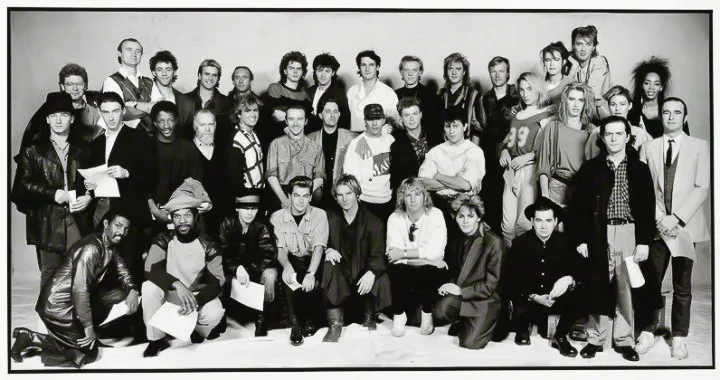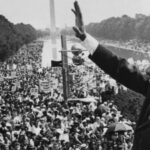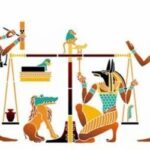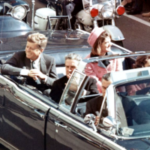December 25, 2024 Hidden history, Music
And there won’t be snow in Africa this Christmas time
The greatest gift they’ll get this year is life
Where nothing ever grows, no rain or rivers flow
Do they know it’s Christmas time at all ?“Band Aid – 1984″
A Band Aid on the conscience. Do they know it’s Christmas ? (1984)
I was a teenager when this song was released, and to be honest, I was not a big fan at the time.
“Do They Know It’s Christmas” opens with Paul Young on vocals, followed by Boy George, George Michael, Simon Le Bon, Sting and Bono.
A number of other artists also contributed to the project.
The song raised more than $24 million for famine relief in Ethiopia.
The impact was shocking.
The U.S. government estimated at the time that the famine had affected nearly 8 million people, about one-fifth of Ethiopia’s population.
Of those, 2.5 million were considered to be in “imminent danger of death,” according to a memo from the U.S. Agency for International Development.
Icon of the poor country
Peter Gill was one of the few Western journalists in Ethiopia in 1984.
Working with Action Aid, a global humanitarian organization, he spent weeks in Korem, the epicenter of the famine, and in the Amhara highlands.
According to Gill, the most obvious consequence of the Band Aid campaign is that Ethiopia has become something of a caricature of poverty and hunger in the minds of Westerners.
“Ethiopia has become the icon of the poor country“, Gill wrote in his 2010 book Famine and Foreigners: Ethiopia since Live Aid.
“Instead of its glorious past and rich culture, Ethiopia is now associated with famine“.
What few realize is that the famine was not an isolated event.
Although drought played a role, many have overlooked the fact that the Ethiopian government’s military policies were the main catalyst.
Mengistu Haile Mariam, general secretary of the Ethiopian Workers’ Party and leader of the Derg (the communist military junta that ruled Ethiopia), had a simple strategy for dealing with famine : resettle Ethiopians.
People starving in the highlands could be sent to the lowlands, where productivity was high and land was plentiful.
According to Gill, “the planned scale of the resettlement program was in keeping with Colonel Mengistu’s image as a pocket-sized African Stalin, and would be carried out in an absolutely ruthless manner.
The resettlement also had a darker political purpose and would be carried out at gunpoint“.
The “darker political purpose” to which Gill refers is that resettlement allowed Colonel Mengistu to deal more effectively with the alliance of rebel groups, including the Eritrean Liberation Movement and the Tiger People’s Liberation Front, that opposed the communist military regime.
Dawit Wolde-Giorgis, aid worker and author of Red Tears : War, Famine, and Revolution in Ethiopia, recalled that Mengistu described his strategy with the Maoist parable of drying up the sea to catch fish.

“Without the sea, there will be no fish.
We must dry up the sea, or if we cannot do it completely, we must bring it to such a level that they will no longer have room to move at will and their movements will be easily restricted”.
Mengistu’s plan may have been militarily effective, but it had a devastating effect on the country’s economy.
Among its many problems, it created a labor surplus in some places and a labor shortage in others.
A 45-year-old farmer named Ibrahim, whom Gill spoke to decades after the famine, recalled being forced to dig graves as a young man because there were not enough workers.
“People were very busy burying the dead.
Because the Derg had taken so many people away for resettlement, there was a shortage of labor, and some of us were forced to become gravediggers“.
Moreover, according to what Buerk wrote in the introduction to Gill’s book:
“The Great Ethiopian Famine changed everything and nothing.
It radically altered the rich world’s sense of responsibility to the hungry and the poor, but it solved nothing“.
As Buerk writes in the introduction to Gill’s book.
“A quarter of a century later, we are still debating the roots of the problem, let alone the solution, and although progress has been made, food insecurity in Ethiopia is getting worse, not better“.
A Band Aid on the conscience
It turned out that writing a song and raising millions of dollars for food relief was the easy part.
Administering the aid effectively was much harder.
In fact, evidence suggests that tens of millions of dollars of international aid, not from Band Aid but from other relief initiatives, were siphoned off to fund a paramilitary communist rebel group.
This is not to say that relief initiatives cannot help those who are suffering, or that people should not help those in need.
Giving is good and can help those in need, especially if it is done prudently, but it should not be the only goal.
The ultimate goal is to help people, and that requires more than just humanitarian efforts.
This is the solution to hunger and poverty.
As the economist Adam Smith pointed out, “All that is necessary to raise a state from the lowest barbarism to the highest degree of prosperity is peace, just taxes, and a tolerable administration of justice”.
Smith’s formula may sound simple, but its application is not.
Power tends to concentrate and manifest itself autonomously.
Dawit Wolde-Giorgis, author of Red Tears, said this was perhaps the greatest scar of the Ethiopian famine.
“The greatest toll of the famine was psychological.
None of the survivors would ever be the same.
The famine left behind a population terrified by the vagaries of nature and the ruthlessness of its government“.
Many Westerners ignore the causes of the Ethiopian famine, but Ethiopians do not, and they seem to have learned their lesson.
“World poverty is a burden to be shared, but there is another principle that is now widely accepted“, Gill writes.
“Poor countries will only lift themselves out of poverty if they take full control of their own destinies“.
For this reason, Ethiopia “has insisted on charting its own path to development”.
They overthrew the communist regime in 1991.
They have steadily expanded economic freedom (though the country still has a long way to go), and prosperity has increased as a result.
In 2018, Abiy Ahmed won the Nobel Peace Prize for ending the country’s 20-year war with Eritrea.
This formula, peace and economic freedom, has the power to transform Ethiopia more than any humanitarian aid.
The Band Aid song urges us to “feed the world“.
That is exactly what economic freedom has done, triggering the greatest reduction in extreme poverty in human history.
It’s also hard to overstate the song’s cultural impact, both positive and negative, although many people chuckle at the line “Do they know it’s Christmas time at all ?”
“As Ethiopians have since pointed out, they obviously knew it was Christmas because the starving were mostly Christians“, Gill notes.














